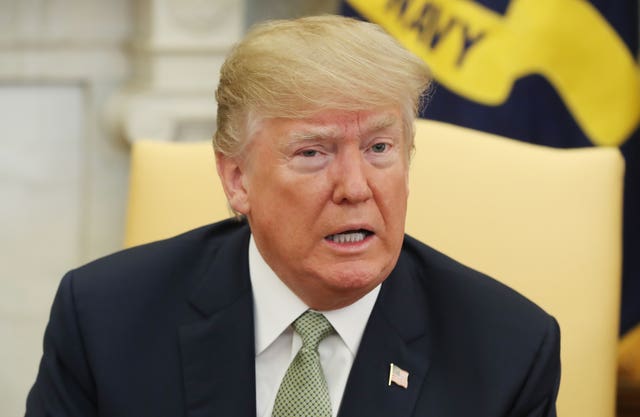
Theresa May has agreed with her American and French counterparts that the international community needs to respond following the suspected Syria chemical weapons attack.
The Prime Minister spoke to Donald Trump and Emmanuel Macron on Tuesday, as speculation mounted about what action will be taken.
Mr Trump has said the apparent poison gas attack in Syria will be “met forcefully”, but did not give a time-frame for any retaliatory action, and he cancelled a foreign trip on Tuesday to manage the crisis.
Downing Street said Mrs May and the two leaders agreed that the international community “needed to respond to uphold the worldwide prohibition on the use of chemical weapons”.
A spokeswoman said Mrs May held separate calls with the two leaders on Tuesday and that they agreed the reports of a chemical weapons attack in Syria were “utterly reprehensible” and that they would “continue working closely together”.
Hugely disappointing that Russia vetoed the proposal at the UN for an independent investigation into Syrian chemical attacks. Russia is holding the Syrian people to political ransom by supporting a regime responsible for at least 4 heinous chemical attacks against its people
— Boris Johnson (@BorisJohnson) April 10, 2018
The Associated Press reported that US officials and counterparts in Britain and France had been discussing a possible joint military response, with sources saying the allies had been weighing up a strike as early as the end of the week.
Meanwhile Europe’s aviation watchdog issued an alert to airlines operating in the Eastern Mediterranean of a possible strike with air-to-ground or cruise missiles into Syria.
On Tuesday the Kremlin’s ambassador to the UN, Vassily Nebenzia, repeated his warning to the West against military action in Syria.
Boris Johnson criticised Russia after it vetoed a US draft resolution at the United Nations which sought to create a new body to determine responsibility for the attack.
The Foreign Secretary said the move was “hugely disappointing” and accused Russia of “holding the Syrian people to political ransom by supporting a regime responsible for at least four heinous chemical attacks against its people.”
Karen Pierce, the UK ambassador to the UN, said it was a “sad day for the Security Council” and “for the people of Douma”, adding that Russia’s “credibility as a member of the council is now in question”.
Ms Pierce said: “By vetoing, Russia has crossed the line in the international order and worse, if possible, history is repeating itself one year on from Khan Shaykhun.”
Russia was joined by Bolivia in voting ‘no’ at the Security Council in New York on Tuesday afternoon, while China abstained.
Mr Nebenzia said threats of US military action “should make us seriously worried, all of us”.
Amid speculation over whether Britain will take action against Syria, Tory chairman of the Defence Select Committee Julian Lewis said “airstrikes can only be effective when they are in support of ground troops”.
And he warned that Britain would be helping al Qaida if it assists with a military campaign against Syrian president Bashar al-Assad.

Mr Lewis told BBC Two’s Newsnight: “What we’ve got here in Syria is a choice between monsters on the one hand and maniacs on the other, and it is absolutely untrue to say that apart from the Kurdish-led forces, the Salafists and the Jihadists are not in control of the opposition groups.
“They are and we will be helping al Qaida if we help them to do a sustained military campaign against the brutal Assad regime.”
The United States is looking to the UK and France for support as it finalises its response to the assault on the rebel-held town of Douma.
President Trump and his French counterpart Mr Macron had already agreed to co-ordinate a “strong, joint response” after talks by telephone.
Mrs May sidestepped questions about whether Britain would be involved in military action during a visit to Cambridge earlier on Tuesday.
She is expected to comment on the situation again on Wednesday during a visit to Birmingham.
A #WhiteHelmet expresses his grief with a heart and message of love and solidarity reading #Douma In My heart in the wake of the heinous chemical massacre on Douma. #Assad_Bombing_Douma_Chemical pic.twitter.com/HPxfDOGzGK
— The White Helmets (@SyriaCivilDef) April 8, 2018
The attack in Douma happened late on Saturday amid a resumed offensive by Syrian government forces after the collapse of a truce with the Army of Islam rebel group.
Syrian opposition activists and rescuers said poison gas was used on the rebel-held town near the capital, an allegation strongly denied by the Assad government.
Families were reportedly found suffocated in their homes and shelters, with foam on their mouths.
Reports suggested more than 500 people, mostly women and children, were taken to medical centres with difficulty breathing, foaming at the mouth and burning sensations in the eyes.
The attack comes almost exactly a year after a chemical atrocity in the northern Syrian town of Khan Sheikhoun killed dozens of people.
That attack prompted the US to launch several dozen Tomahawk cruise missiles at a Syrian air base.
Russia and Syria have blamed Israel for an attack on a Syrian military airport on Monday that reportedly killed at least 14 people.


Comments: Our rules
We want our comments to be a lively and valuable part of our community - a place where readers can debate and engage with the most important local issues. The ability to comment on our stories is a privilege, not a right, however, and that privilege may be withdrawn if it is abused or misused.
Please report any comments that break our rules.
Read the rules here